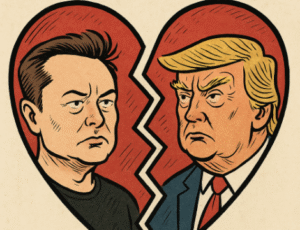#elonmusk #trump #djt #tsla #Tesla $TSLA $DJT #musktrump #bromance #elon
Just months ago, Donald Trump and Elon Musk were seen as political partners reshaping America. Now, their friendship has dissolved into open warfare—over what Trump calls his “Big Beautiful Bill,” and what Musk says is a fiscal disaster. The clash between the former president and the world’s richest man has become the defining political soap opera of 2025.
From Allies to Adversaries
The story began with mutual admiration. Musk, the billionaire CEO of Tesla and SpaceX, was a top donor and confidant during Trump’s 2024 campaign. He contributed more than $250 million and played a key role in the launch of Trump’s new Department of Government Efficiency (DOGE). The two appeared at rallies together and touted their shared vision for a leaner, more competitive America.
But behind the scenes, tension grew. Trump’s proposed “One Big Beautiful Bill”—a sprawling package of tax cuts, infrastructure spending, and corporate incentives—was designed to secure Trump’s legacy as a dealmaker. The bill promised to slash corporate taxes further, pour trillions into infrastructure, and revive coal and steel industries.
Musk, initially supportive of tax reform, grew alarmed as the bill swelled in size. In private meetings, he warned that it favored “obsolete industries” over innovation, and would drive up the national debt. By mid-June, Musk had distanced himself from the bill and from DOGE, resigning his advisory role.
Musk’s Crusade Against the Bill
On June 30, Musk went public. In a flurry of social media posts and interviews, he called Trump’s plan “a catastrophe in the making.” He argued that the bill would enrich cronies, saddle future generations with debt, and destroy millions of jobs in clean tech and advanced manufacturing.
In one viral post, Musk wrote:
“The Big Beautiful Bill isn’t beautiful at all. It’s fiscal insanity dressed up as patriotism.”
Musk’s critique went further. He accused Trump of abandoning innovation and betraying American competitiveness. He pledged to use his fortune to fight the bill, vowing to back primary challengers against any Republican who supported it. He floated the idea of starting a new political party—dubbed the “America Party”—to break Trump’s grip on the GOP.
Trump’s Retaliation
Trump, never one to back down from a public feud, hit back hard. At a rally in Ohio, he mocked Musk’s businesses, suggesting that without government subsidies, Musk would be “on a one-way ticket back to South Africa.”
“Elon Musk may get more subsidies than any human being in history,” Trump thundered. “If he’s so worried about spending, maybe DOGE should look into him first. Save the taxpayers billions!”
Trump hinted that DOGE might investigate federal contracts awarded to Musk’s companies, a clear warning that dissent would not go unpunished. He also took to social media to label Musk “Ungrateful Elon” and a “phony patriot.”
A Friendship in Tatters
The collapse of Trump and Musk’s alliance is as personal as it is political. Sources close to both men describe a relationship that once thrived on mutual flattery and shared ambitions but has now curdled into resentment.
Musk reportedly felt betrayed when Trump embraced policies that favored fossil fuels over clean energy. Trump, in turn, saw Musk’s opposition as disloyalty—especially after years of favorable tax treatment and federal contracts for SpaceX and Tesla.
“Musk wants to play kingmaker now,” one Trump insider said. “But Trump built him up, and Trump can tear him down.”
The Stakes
The fallout has ramifications far beyond two oversized egos.
The Economy
Musk’s warnings about the bill’s impact on clean tech have resonated on Wall Street. Tesla stock dipped 6% after his comments, as investors braced for potential retaliation from Washington. Infrastructure stocks, meanwhile, rallied on hopes the bill would pass.
The GOP
Musk’s promise to bankroll primary challengers could upend the 2026 midterms. Several Republican senators are reportedly reconsidering their support for the bill, wary of becoming targets of Musk’s vast war chest.
Tech and Subsidies
Trump’s threat to review subsidies for Musk’s companies has sparked alarm in Silicon Valley. SpaceX depends on NASA contracts; Tesla benefits from federal EV tax credits. A drawn-out war could jeopardize billions in federal funding.
Where It Goes Next
The “Big Beautiful Bill” is scheduled for a Senate vote later this month. Musk is expected to intensify his campaign against it, with ads, rallies, and op-eds in key swing states. Trump, meanwhile, is doubling down, framing the bill as essential for restoring America’s greatness.
Their clash has become a litmus test for the future of the Republican Party. Is it Trump’s party, rooted in nostalgia and heavy industry? Or does Musk’s vision of tech-driven dynamism have a place in conservative politics?
A Tragedy of Titans
What makes the feud so compelling is how personal it feels. These aren’t just two public figures with differing views—they are former allies who helped build each other up. Now, they are locked in a battle that could reshape American politics and industry for years to come.
As one analyst put it:
“It’s not just a policy fight. It’s the end of an era of cooperation between tech and Trumpism. And no one knows what comes next.”
Timeline of the Feud
- 2024: Musk donates to Trump, co-leads DOGE.
- May 2025: Musk begins voicing private concerns about the bill.
- June 2025: Musk resigns from DOGE, calls the bill reckless.
- June 30, 2025: Musk publicly attacks the bill; Trump retaliates.
- July 2025: Both sides escalate rhetoric ahead of Senate vote.
Conclusion
The Trump-Musk fallout is more than a political spat. It is a collision of two visions of America: one rooted in the past, the other looking to the future. As the Senate prepares to vote on Trump’s landmark bill, the nation watches—not just to see who wins this round, but to glimpse the shape of the battles to come.







Be First to Comment